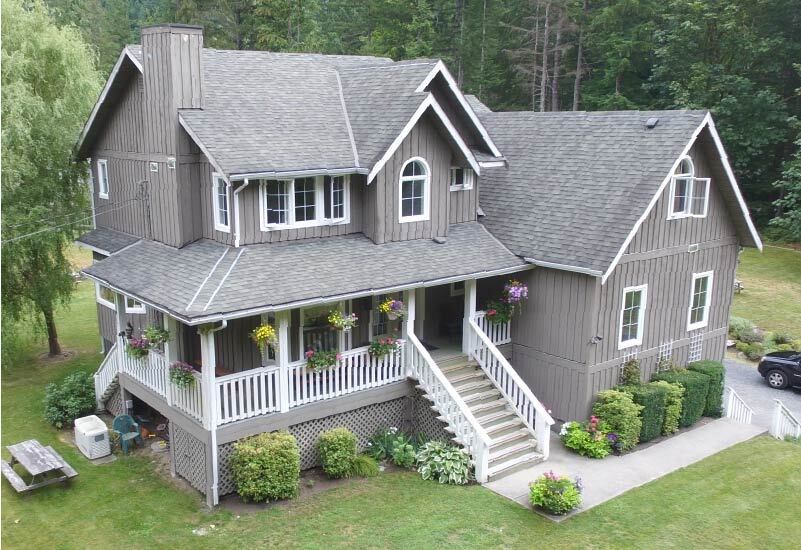Tucked away in the middle of the forest, opposite the Paradise Valley Campground, lies the Paradise Valley Healing Centre, which offers a blend of therapies to “support individuals recovering from trauma and addiction.”
Drawing on a combination of Western medicine, Eastern philosophies, and creative expression, the centre aims to “help people find emotional balance and healing.”
“Most of the people that come to the centre have unresolved trauma and emotional pain,” said Nirmala Raniga, founder of the centre.
“We focus on creating an environment where they can heal from addiction and psychological trauma, integrating Western medicine and Eastern practices like yoga, meditation, and Ayurveda.”
Art therapy for emotional expression
One of the key elements of the centre’s approach is art therapy, which provides a way for participants to “express emotions that may be difficult to articulate.”
“Trauma is often trapped in the brain as a sensory experience,” said Raniga.
“Art therapy allows people to access those parts of the brain that may not have words but still need to be soothed and released.”
The centre offers art sessions where guests engage with colours, forms, and textures to explore their emotions. “It’s not about creating a perfect drawing,” Raniga said.
“It’s about expressing what comes out and then discussing what those images might mean.”
Research done in Washington shows that art therapy has been found effective for individuals dealing with trauma, PTSD, anxiety, and depression. Its non-verbal nature “helps participants access suppressed memories and emotions, promoting emotional regulation and stress relief.”
A review of 37 studies also found that art therapy helped reduce stress in about 80% of participants, showing how creative activities can effectively support mental well-being.
Incorporating Ayurveda for balance
The centre also integrates Ayurvedic principles: the traditional Hindu system of medicine.
“Ayurveda teaches us that we are all made up of the five elements—space, air, fire, water, and earth—and these manifest in three doshas: Vata, Pitta, and Kapha,” said Raniga.
The centre’s vegetarian meals are designed to balance these doshas. “The foods we eat affect not just our bodies but also our emotions,” she said.
Guests are also encouraged to practice self-massage using dosha-specific oils. “For example, we recommend sesame oil for Vatas and coconut oil for Pittas,” said Raniga.
In addition to a vegetarian diet, daily routines include yoga and meditation. “A typical day starts with yoga at 7 a.m. and meditation at 8 a.m., followed by group therapy,” she said.
“The focus is on creating balance, not just in the mind but also in the body.”
A 2015 study found that Ayurvedic medicine can benefit people with coronary heart disease. This makes sense since yoga and meditation—key parts of Ayurveda—are known to help lower blood pressure, reduce stress and improve heart health.
Western medicine meets Eastern practices
While the centre’s foundation is rooted in traditional practices, it also offers medical support.
“We have a centre physician, a psychiatric nurse, and access to a consulting psychiatrist,” said Raniga.
“Our clinical team ensures that every guest receives a bio-psychosocial assessment and tailored care.”
However, the centre is not a detox facility, and the intake process ensures that clients are ready to participate in the therapeutic program.
“We make sure individuals don’t require detox services before admission, as that’s outside the scope of our care,” Raniga said.
Supporting the community
Paradise Valley Healing Centre has provided services for more than 14 years and offers treatment to those in need through partnerships with Vancouver Coastal Health and Sea to Sky Mental Health Services.
“We provide 12 free treatment beds each year—one per month—for individuals from Squamish who cannot afford care,” said Raniga.
Despite the availability of services, Raniga notes that many people are unaware of the centre’s presence. “Sometimes people don’t know what’s available in their own neighbourhood,” she said.
“It took me three years to rezone the property and get the necessary licensing, but I knew it was important to provide this kind of care.”
Reflecting on the need for holistic care, she emphasizes the importance of emotional healing. “When we don’t walk through our emotions, we get stuck in them,” she said.
“Addiction and unhealthy coping often arise from that emotional pain. It’s essential that people reach out for support—and that families support their loved ones, too.”
The centre offers programs ranging from one to six weeks, with prices starting at $7,500 and increasing based on program length. Additional weeks are $5,000 each, and GST applies.
Bhagyashree Chatterjee is The Squamish Chief’s Indigenous affairs reporter. This reporting beat is made possible by the Local Journalism Initiative.
The Squamish business beat was sparked by locals asking for more such coverage. This business was chosen because it is within Chatterjee’s region and helps expand residents’ understanding of what is available in Paradise Valley, a region that has traditionally not gotten the same coverage as Squamish proper. If you would like to be considered for this beat, email [email protected].

.png;w=120;h=114;mode=crop)


